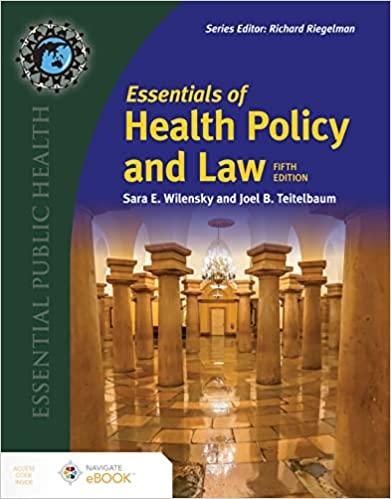Question
Case Study U.S SUPREME COURT EMPLOYMENT DECISIONS/RETALIATION Burlington N. & Santa Fe Ry. Co. v. White, 126 S. Ct. 2405 (2006). In a unanimous decision,
Case Study
U.S SUPREME COURT EMPLOYMENT DECISIONS/RETALIATION
Burlington N. & Santa Fe Ry. Co. v. White, 126 S. Ct. 2405 (2006). In a unanimous decision, the Supreme Court resolved a split among the circuit courts as to what constitutes unlawful retaliation under Title VII. In a surprising move, the Court sided with the often-reversed Ninth Circuit and adapted an expansive view of what constitutes retaliations under Title VII. The Court held that any materially adverse employment action that is based on a retaliatory motive and that might deter a "reasonable" worker from making or supporting a charge of discrimination violates Title VII. ld. at 2409. The Supreme Court also held that even conduct that does not occur in the workplace and is not related to employment may constitute retaliation.
In this case, plaintiff Sheila White, the only female track laborer in Burlington Northern & Santa Fe Railway Co.'s ("Burlington") Rail Yard Maintenance Department, was assigned to operate a forklift--a duty that fell within her current job description, but that was considered by all to be less arduous, less dirty, and more prestigious. White complained to Burlington that her immediate supervisor made inappropriate remarks to her and told her that women should not be working in the department. Following an investigation, White's supervisor was suspended for 10 days and ordered to attend harassment prevention training. Shortly thereafter, White's supervisor's boss removed White from the forklift duty and reassigned her to perform only standard track laborer tasks. A few days later, White and another supervisor had a dispute, resulting in White's suspension without pay for 37 days for insubordination. White's internal grievance resulted in her being reinstated with back pay.
White then filed an Equal Employment Opportunity Commission ("EEOC") charge; and subsequently filed a lawsuit in federal court alleging her suspension and loss of forklift duties were retaliation in violation of Title VII. After a jury verdict for White, Burlington appealed the decision all the way to the Supreme Court. The Court surveyed the varying standards used by federal courts to determine what constitutes retaliation for Title VII purposes, which range from the most restrictive ("the challenged action must result in an adverse effect on the terms, conditions, or benefits of employment," id. at 2410 (internal quotation marks and citation omitted)), to the most expansive ("adverse treatment that is based on a retaliatory motive and is reasonably likely to deter the charging party or others from engaging in protected activity," id. at 2411 (internal quotation marks and citation omitted)). Adopting a more expansive view, the Court held that Title VII's anti-retaliation provision extends beyond workplace-related or employment-related acts or harms, but only if a reasonable worker in the plaintiff's circumstances might well have been dissuaded from making or supporting a discrimination charge because of such acts or harms.
Since the decision in Burlington, several Ninth Circuit district courts have used the Supreme Court's formulation of the retaliation standard to deny summary judgment for employers. For example, summary judgment was denied to an employer when a male supervisor and male co-worker "virtually stopped speaking to" the complaining employee after she complained about their berating behavior. Wyatt v. Ford Motor Co., No. C04-5666 RBL, 2006 WL 2009230, at *5 (W.D. Wash. July 17; 2006). Summary judgment was also denied to an employer when a supervisor reported a policy violation after an employee complained about the supervisor. Wells v. Fred Meyer Stores, Inc., No. Cv-05-86-E-BLW, 2006 WL 2472664 (D. Idaho Aug. 25, 2006). The Burlington case will renew the emphasis placed on retaliation claims based on relatively minor matters, despite the Court's caution that "materially adverse" retaliatory actions sufficient to support a claim of retaliation do not include such things as "petty slights or minor annoyances that often take place at work and that all employees experience." 126 S. Ct. at 2415.
- case summary-
- arguments for plaintiff -
- arguments for the defendant -
- court's decision and reason -
- what you feel the court should have decided and why -
- what the company (i.e., HR) should have done to prevent a lawsuit -
- what the Company (i.e., HR) should do in the future -
- three (4) sources listed in a bibliography format -
Step by Step Solution
There are 3 Steps involved in it
Step: 1

Get Instant Access to Expert-Tailored Solutions
See step-by-step solutions with expert insights and AI powered tools for academic success
Step: 2

Step: 3

Ace Your Homework with AI
Get the answers you need in no time with our AI-driven, step-by-step assistance
Get Started


